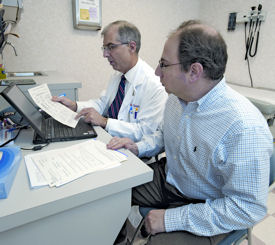In the News
New opioid therapy guidelines released; PFO closure may help migraines.
New opioid therapy guidelines
Two professional societies released guidelines on opioid therapy to treat chronic, noncancer pain.

The American Pain Society and the American Academy of Pain Medicine convened a multidisciplinary panel of 21 experts to review evidence and compose 25 recommendations. The recommendations, published in the February Journal of Pain, advise providers to:
- Do a history, physical exam and appropriate testing—including a risk assessment of substance abuse—before starting a patient on chronic opioid therapy (COT);
- Consider a COT trial for patients whose pain is moderate or severe and for whom it has an adverse impact on function or quality of life;
- Reassess patients on COT periodically, with monitoring to include documenting pain and functioning levels, adherence, and presence of adverse events;
- Use COT on patients with a history of drug abuse or psychiatric issues only if they can be monitored more frequently and strictly;
- Do periodic urine drug screens on patients at high risk or who engaged in drug-related behavior in the past, and possibly on patients who aren't high-risk, too; and
- Evaluate health status, adherence and side effects on an ongoing basis in patients on high doses of COT, and consider more follow-up visits.
In February, the FDA sent letters to opioid manufacturers asking them to develop plans to reduce the misuse of their drugs. The plans, which are meant to help reduce the rising incidence of overdose and abuse, might include enhanced warnings on labels or restricting the kinds of patients who can use the drugs. A list of affected drugs, most of which are high dose and/or extended release, is online.
ACP Internist offers a supplement on opioid pain management and pocket cards online.
PFO closure may help migraines
Closure of patent foramen ovale (PFO) led to significant relief for migraine sufferers who participated in a recent study.
The case-controlled study published in the February Journal of the American College of Cardiology: Cardiovascular Interventions was the first to enroll severe migraine patients with a large PFO who had not suffered prior stroke or transient ischemic attacks, but who showed silent brain lesions on magnetic resonance imaging. Previous studies of PFO closure on patients following stroke or decompression illness have resulted in migraine improvements in 75% of patients.
Researchers followed 82 patients with high-grade right-to-left shunt, moderate/severe migraine, and subclinical lesions at MRI. Of those, 53 consented to undergo PFO closure while 29 received standard medical therapy. At six months, the closure group patients reported significant reductions in frequency and severity of attacks. Results included:
- Migraine disappeared in 34% of the closure group vs. 7% of controls;
- Significantly more closure group than control group patients reported a 50% or greater reduction in attacks (87% vs. 21%, respectively) and a 50% or greater reduction in disabling attacks (89% vs. 17%, respectively); and
- Disabling attacks disappeared in 53% of closure group patients vs. 7% of controls.
Researchers cautioned that larger studies are needed to confirm the results and that the relationship between PFO and migraine still isn't clearly understood.
Guidelines for prostate cancer drugs
Asymptomatic men with a prostate-specific antigen (PSA) ≤ 3.0 ng/mL who are regularly screened or considering screening may benefit from talking with their doctor about the benefits and risks of 5-α-reductase inhibitors (5-ARI).
To develop an evidence-based guideline on prostate cancer chemoprevention, the American Society of Clinical Oncology and the American Urological Association did a systematic literature review of 15 randomized clinical trials to develop evidence-based recommendations. They published the guidelines in The Journal of Urology.
Men taking a 5-ARI can expect a 50% reduction of PSA within 12 months. Because these changes vary and there is no prospectively validated level, the guidelines did not recommend a point at which to biopsy men taking a 5-ARI.
The committee identified issues for physicians to discuss with patients:
- 5-ARIs reduce the incidence of prostate cancer, but not to zero,
- the elevated rate of high-grade cancer and the potential explanations for it,
- the lack of information on the long-term effects of 5-ARIs beyond 7 years,
- possible but reversible sexual adverse effects, and
- the likely improvement in lower urinary tract symptoms.
Men taking 5-ARIs for lower urinary tract [obstructive] symptoms may benefit from a similar discussion and an explanation that the improvement should be balanced with the potential risks of high-grade prostate cancer.
Reminders effective for colon cancer screening

It's effective to mail fecal test kits to patients if they're overdue for colon cancer screening, researchers learned. Mailed reminder packages to patients and electronic reminders to physicians whose patients are overdue may increase screening among adults who have more frequent primary care visits.
Researchers randomized 21,860 patients and 110 doctors in a controlled trial at 11 ambulatory health care centers. Patients received mailed packages with an educational pamphlet, a fecal occult blood test kit and instructions for scheduling flexible sigmoidoscopy or colonoscopy. Physicians received electronic reminders during office visits with patients overdue for screening. Researchers reported results in the Archives of Internal Medicine.
- Screening rates were higher (44.0% vs. 38.1%, P<.001) for patients who received mailings. The effect increased 3.7% for those age 50 to 59 years, 7.3% for those age 60 to 69 years, and 10.1% for those age 70 to 80 years (P=.01).
- Electronic reminders increased screening rates among patients with three or more primary care visits (59.5% vs. 52.7%, P=.07).
- Adenoma detection increased with patient mailings (5.7% vs. 5.2%, P=.10) and physician reminders (6.0% vs. 4.9%; P=.09).
ACP Internist offers expert, easy-to-follow guidelines for encouraging colon cancer screening, including video presentations.
New score detects Afib risk
Researchers have designed a risk score to help identify an individual's likelihood of developing atrial fibrillation, a Feb. 28 Lancet article said.
To create the score, researchers selected 4,764 Framingham Heart Study subjects aged 45-95 years then monitored them for up to 10 years for a first atrial fibrillation event. They looked at characteristics like age, sex, alcohol consumption, body mass index (BMI), blood pressure, cholesterol levels, ECG features and indicators of heart disease, and performed a Cox regression analysis to assess which posed risks.
During follow-up, 10% of participants developed atrial fibrillation. For men, there were 6.3 events per 1,000 age-adjusted person-years; for women, there were 3.3 events per 1,000 age-adjusted person-years. The predicted 10-year risk of atrial fibrillation was 2% for those with BMI at or greater than 30, 2% for those with systolic blood pressure at or greater than 160, and 2% for those being treated for hypertension. Also, the younger a person was when heart failure or significant cardiac murmur developed, the greater the risk of atrial fibrillation later.
The risk scoring system is based on clinical factors that are easy to measure in primary care, making it convenient for providers to use, the authors said. Those at high risk can be targeted for preventive measures. A limitation of the score, however, is that it was developed and validated with white, middle-aged-to-elderly subjects, so it may not generalize to young people or other ethnic groups, they said.
PPIs may weaken benefits of clopidogrel after ACS
Clopidogrel and proton pump inhibitors (PPIs) after acute coronary syndrome (ACS) may increase risk of death or readmission, leading some to suggest that it not be used for prophylaxis.
PPIs are frequently prescribed to reduce the risk of gastrointestinal tract bleeding from taking clopidogrel and aspirin. But studies have reported that omeprazole decreases clopidogrel's platelet inhibitory effect. Researchers did a retrospective cohort study of 8,205 ACS patients taking clopidogrel after discharge from 127 Veterans Affairs hospitals between Oct. 1, 2003, and Jan. 31, 2006. They reported results in the Journal of the American Medical Association.
Of the 8,205 patients, 63.9% were prescribed PPI in addition to clopidogrel at discharge, during follow-up, or both and 36.1% were prescribed clopidogrel only. Death or rehospitalization for ACS occurred in 20.8% (615) of patients taking clopidogrel without PPI and 29.8% (1,561) of patients combining them. The combination was associated with increased risk of death or rehospitalization for ACS compared with use of clopidogrel only and a higher risk for revascularization procedures, but no higher risk for all-cause mortality. The increased risk of adverse events observed with the concomitant use of clopidogrel and PPI was seen even after controlling for the use of aspirin, as well as after excluding patients with a history of gastrointestinal bleeding. A





